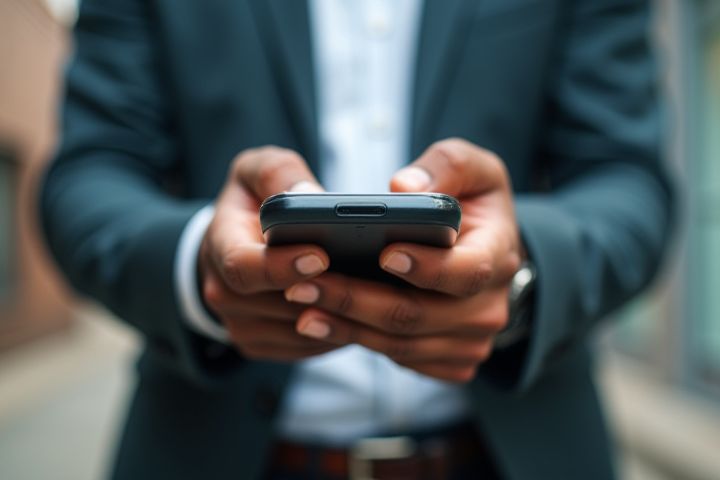
Mobile banking in Nigeria has rapidly transformed the financial landscape, offering users convenient access to banking services through their smartphones. With platforms such as Paga, OPay, and Paystack, you can effortlessly perform transactions, pay bills, and manage your finances without needing to visit a physical bank. The adoption of mobile banking is driven by the increasing smartphone penetration and the demand for financial inclusion in a country where a significant proportion of the population remains unbanked. Security features, such as biometric authentication and encryption, are increasingly implemented to protect users' data and transactions. As mobile banking continues to evolve, it fosters economic growth and enhances the accessibility of financial services across urban and rural areas in Nigeria.
USSD codes for quick transactions
Mobile banking in Nigeria leverages USSD codes to facilitate swift transactions, allowing users to perform banking activities without internet access. This technology enables customers to check account balances, transfer funds, and pay bills seamlessly, providing an essential service in regions with limited connectivity. Offerings from various banks, including access to loan applications and airtime purchases, make mobile banking a versatile tool for everyday financial management. Embracing USSD codes helps enhance financial inclusion, empowering millions of Nigerians to conduct transactions securely and efficiently.
Daily transaction limits
Mobile banking in Nigeria imposes daily transaction limits to enhance security and manage funds effectively. Typically, these limits vary by financial institution, accommodating factors like account type and user verification level. Users should be aware that exceeding these limits may result in transaction failures or require additional verification steps. Understanding these constraints helps you plan your financial activities better while maintaining security in mobile transactions.
Required BVN for account linking
In Nigeria, linking your bank account to mobile banking services necessitates a Bank Verification Number (BVN). The BVN serves as a unique identification for bank customers, enhancing security and minimizing fraud. To successfully link your account, you must provide your BVN during the registration process, ensuring seamless transactions. This requirement not only strengthens authentication but also streamlines access to various banking features and services via mobile platforms.
Registration through bank apps
Mobile banking in Nigeria has revolutionized the way you conduct financial transactions, emphasizing user-friendly registration processes via bank applications. Major banks like Access Bank and GTBank offer seamless account setup, enabling customers to register using their mobile numbers and biometric authentication for enhanced security. The convenience of accessing accounts, transferring funds, and paying bills directly from smartphones has increased financial inclusion across diverse demographics. With the growing adoption of mobile banking, Nigeria is witnessing a shift towards a cashless economy, making banking accessible to millions.
Security features like OTP and biometrics
Mobile banking in Nigeria emphasizes robust security features to protect user transactions and sensitive information. One-Time Password (OTP) verification adds a crucial layer of security, ensuring that only authorized users can access their accounts. Biometric authentication, including fingerprint and facial recognition, enhances this security framework by utilizing unique biological traits for identity verification. As you engage in mobile banking, these features work together to safeguard your financial activities against unauthorized access and fraud.
Instant money transfers
Mobile banking in Nigeria emphasizes instant money transfers, enabling users to send and receive funds in real time, thereby enhancing financial accessibility. Services offered by platforms like Paga, Interswitch, and Flutterwave cater to diverse needs, from personal transactions to business payments. These digital solutions utilize secure encryption technologies to safeguard transactions, ensuring user confidence and safety. By integrating mobile banking with local payment systems, you can experience seamless financial interactions that bridge the gap between traditional banking and modern digital finance.
Network connectivity issues
In Nigeria, mobile banking relies heavily on robust network connectivity, which often presents significant challenges for users. Frequent network outages and poor signal quality can hinder transaction speed and reliability, impacting the overall user experience. Furthermore, the digital divide between urban and rural areas exacerbates these connectivity issues, as many rural users struggle with limited access to stable mobile networks. To enhance your mobile banking experience, it's essential to be aware of the network conditions in your area and consider using services with backup options or alternative access points.
Mobile data usage
Mobile banking in Nigeria relies heavily on mobile data usage, enabling seamless financial transactions through smartphones and mobile devices. The increasing penetration of 4G and 5G networks enhances the accessibility and speed of these services, making banking more convenient for users across urban and rural areas. As a result, financial service providers are adapting their platforms to ensure they are data-efficient, thus reducing costs for users while maximizing functionality. You can enjoy a range of services, including money transfers, bill payments, and account management, all optimized for mobile data efficiency.
Compatibility with smart and feature phones
Mobile banking in Nigeria emphasizes compatibility with both smart and feature phones, ensuring accessibility for all users regardless of their device type. This inclusivity allows millions of unbanked individuals to participate in the digital economy, utilizing services like money transfers, bill payments, and account management. Various mobile banking platforms leverage USSD technology for feature phones, enabling secure transactions without the need for internet connectivity. Your experience can vary depending on the mobile banking app you choose, making it essential to select one that meets your specific needs for convenience and security.
Customer service availability
Mobile banking in Nigeria prioritizes customer service availability, ensuring that users have 24/7 access to support for their financial needs. Various banks offer multiple channels, including in-app chat, call centers, and social media platforms, facilitating quick resolutions to user queries. Enhanced customer service not only fosters trust but also drives user engagement, making banking more convenient for the growing population of mobile users. By focusing on customer experience, Nigerian mobile banking apps can adapt to meet the unique challenges of a dynamic financial landscape.
